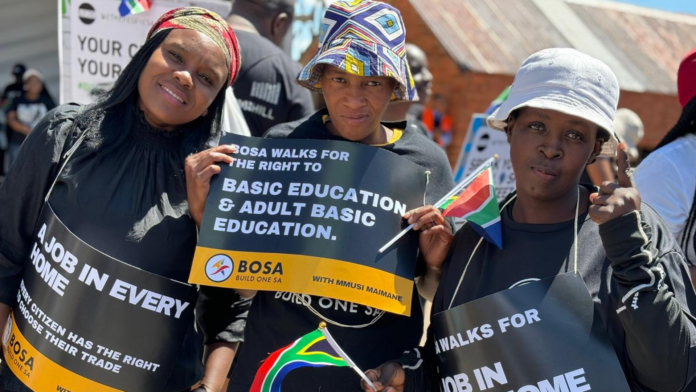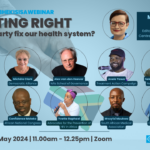| Universal access to healthcare | Climate change | Food security |
| Social grants | Basic income grant | Tuberculosis |
| HIV | Corruption | Gender-based violence |
Here’s what BOSA says about health issues.
Universal access to healthcare
BOSA’s manifesto doesn’t mention universal health coverage or the National Health Insurance (NHI) scheme. Universal health coverage, which gives everyone access to the same basic health services, regardless of whether they can pay for it, is a 2030 sustainable development goal. At the moment, South Africa has a two-tier (public and private) health system. The NHI Bill is the government’s plan for rolling out universal healthcare.
In its only direct mention of the healthcare system, BOSA promises reliable public health services. Overall, the party’s manifesto is a plan to create jobs. In this context it mentions that the country faces a critical shortage of doctors because of red tape and bad financial management, which caused the “systemic collapse of [among others] healthcare”.
South Africa has eight doctors for every 10 000 people, according to 2021 data from the World Health Organisation. This is about half the global average. However, the country is training more doctors than it can hire because of budget constraints. Doctors who do have jobs in the state sector aren’t paid enough, though, said the South African Medical Association last year.
Click here to go to the elections manifesto analysis tool.
Climate change
While the science around climate change is clear, BOSA’s manifesto says it wants to encourage “debates about the right mix of renewable energy and fossil-fuel energy”, as well as whether nuclear energy might be appropriate. It mentions renewable energy when it speaks about revamping the country’s electricity sector and getting private providers involved in generating power as part of the party’s overall mission to create jobs.
BOSA promises to use natural resources in the best way and adopt “forward-looking renewable and decentralised energy” so that the country will have reliable and environmentally sustainable electricity provision, whether it’s nuclear power generated by small reactor units or comes from coal. The party hasn’t set specific goals in changing the energy mix and doesn’t suggest sources for funding.
BOSA’s manifesto doesn’t mention the targets South Africa agreed to for achieving net zero carbon emissions by 2050 or a just transition, which is about making sure that people who work in industries that rely on fossil fuels now won’t lose their jobs unfairly. Net zero refers to the amount of greenhouse gases we emit (mostly from burning coal, oil and gas in producing electricity or fuelling vehicles) balancing with the amount the Earth’s ecosystems are able to absorb naturally, so that there’s no build-up of these gases in the atmosphere where they form a layer that traps heat and results in the Earth heating up. To keep global warming, as a result of too many greenhouse gases emitted into the air, to a level at which the Earth continues to be liveable, greenhouse gas emissions need to be reduced by 45% by 2030 and we need to reach net zero by 2050. More than 190 countries, including South Africa, signed up to the Paris Agreement to reach these goals. Each country has individual targets that feed into the global vision, depending on how much they contribute to climate change. Read about South Africa’s targets here.
Click here to go to the elections manifesto analysis tool.
Food security
Food security gets a passing reference in BOSA’s manifesto — which it calls a “jobs plan” — when it mentions that “close to 14-million South Africans have inadequate access to food”. The country’s latest general household survey shows 22% of people didn’t have enough food in 2022. That works out to just over 13-million people.
BOSA doesn’t specify how it will address food security while working on removing barriers that stop people from moving to a better financial position.
Click here to go to the elections manifesto analysis tool.
Social grants
The BOSA manifesto doesn’t mention plans for handling social grants, a basic income grant or any other form of social security. However, it does say that the current social grants are a “pittance” and calls the South African Social Security Agency “incompetent” in administering the money. Instead, through its jobs plan, BOSA wants people to “add value to the marketplace and contribute to the economic and social needs of the country”. BOSA says it will also introduce a year-long voluntary national civilian service programme for school-leavers to bring young people into the economy. They will get work-based training in fields such as community healthcare, thereby gaining work experience while earning a small allowance. While volunteer or intern programmes can provide access to training and experience, they can come with pitfalls that need to be worked through, like being underpaid, emotional stress and inadequate support.
Click here to go to the elections manifesto analysis tool.
Basic income grant
The BOSA manifesto doesn’t mention plans for handling social grants, a basic income grant or any other form of social security. However, it does say that the current social grants are a “pittance” and calls the South African Social Security Agency “incompetent” in administering the money. Instead, through its jobs plan, BOSA wants people to “add value to the marketplace and contribute to the economic and social needs of the country”. BOSA says it will also introduce a year-long voluntary national civilian service programme for school-leavers to bring young people into the economy. They will get work-based training in fields such as community healthcare, thereby gaining work experience while earning a small allowance. While volunteer or intern programmes can provide access to training and experience, they can come with pitfalls that need to be worked through, like being underpaid, emotional stress and inadequate support.
Click here to go to the elections manifesto analysis tool.
Tuberculosis
The BOSA manifesto doesn’t mention tuberculosis (TB) specifically. TB kills more people than any other illness in South Africa.
Click here to go to the elections manifesto analysis tool.
HIV
The BOSA manifesto doesn’t mention HIV — despite about one in eight South Africans living with HIV by the end of 2022. About 75% of people with HIV are on antiretroviral treatment.
Click here to go to the elections manifesto analysis tool.
Corruption
BOSA mentions corruption when it talks about its plans for dealing with the problems South Africa faces with regard to electricity, education and criminal justice. Its plan wants to create state structures that can provide basic services, put government plans in place and root out the malpractice and corruption that “impedes well-meaning civil servants from carrying out their duties” in these sectors. To do this, BOSA:
- wants to break the monopoly of existing utilities like Eskom and instead promote competition, transparency and innovation so that collusion and corruption will be rooted out
- will introduce an independent education ombud to improve education outcomes and reduce corruption
- says it will take more than money to restore the police; it needs better leaders and corrupt and poor-performing staff should be fired.
BOSA says it will give the Independent Police Investigative Directorate (aka the Hawks) the power to hold officers accountable and build the police up from station level. They say they will recruit and train 120 000 new officers to increase visible policing and boost specialised detective services at station level. BOSA promises to give the police enough tools, such as vehicles and rape kits — resources that are perennially in short supply in the police and which affect the outcome of criminal cases.
The backlog in forensic services and run-down facilities are often raised in critiques, despite the government’s assurances that they’re making headway in clearing the pile-up of files.
The party doesn’t suggest where funding for this turnaround will come from.
Click here to go to the elections manifesto analysis tool.
Gender-based violence
A BOSA government promises it will respond better to gender-based violence. (Crime statistics for the 2022/23 financial year show that sexual assault and rape make up more than 90% of all reported sexual offences. Over the past 10 years, numbers have not come down much, with the total number of reported cases hovering around 52 000 per year. Almost 43 000 rapes were reported in the past year, similar to the numbers over the last decade.)
A BOSA government will put in place an automated national register for protection orders. (These are free, short-term protection mechanisms that can, in theory, help victims of domestic violence get away from violence in intimate relationships but if it’s not known that someone has a protection order against someone else or they’re not upheld by the authorities, they are of little use.) According to the Domestic Violence Act an online repository of protection orders can be set up.
BOSA will advocate for an updated and public sexual offenders register. Currently, the national register of sex offenders is kept confidential, although prospective employers like schools, crèches and hospitals are allowed to check whether someone they’re considering for a job has been found guilty of sexual offences against children or mentally disabled people. Convicted offenders are also not allowed to apply for foster care or adoption, or to work with children. Personal information is tightly controlled. By comparison, in the United States, registries are generally available online and the Sex Offender Registration and Notification Act tracks the movement of sex offenders across states.
BOSA promises to build more specialised sexual offences courts. (A ministerial advisory task team on the adjudication of sexual offences has worked for over a decade on getting more courts to deal with sex crimes and help victims. In 2022, there were 299 courts for dealing with sexual offence matters. While 102 of these provided a catalogue of victim-support services, there was still a significant backlog of cases.)
A BOSA government promises to invest in specialised training for all first responders, including police officers and court officials, to handle GBV cases and offer survivor-centred support. They don’t say how they will fund these substantive extra measures
Click here to go to the elections manifesto analysis tool.
Read the full, original manifesto here.




